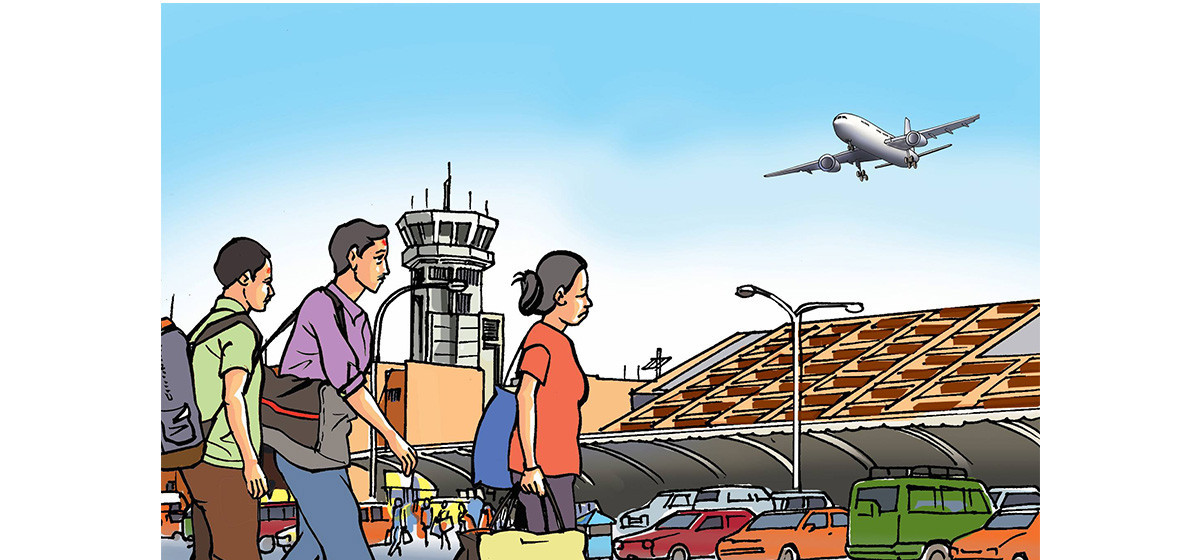
OR


Manju Dhodari
The author is a student of Master’s degree at Department of English, Tribhuvan Universitynews@myrepublica.com
More from Author
Rising cases of suicide by students for failing the exams calls for immediate incorporation of emotional and psychological counseling in our pedagogy
Pedagogically, teaching-learning in the classroom aims at imparting knowledge and skills to the students. Successful teaching-learning rests on pedagogical practices. It’s difficult for any teacher (on all levels) to mobilize the crowd of students with diverse interests, needs, desires and backgrounds.
What is alarming is teaching-learning suffers if pedagogical system is not timely updated and if socio-emotional aspect of the students is ignored.
Samir Lungwa, a resident of Malta, was at his early teens. A fifth grader at a local school, he was found hanging to death at his own residence. Upon the preliminary investigation, the police discovered a suicide note on the spot. It’s hard to believe that a boy of such early age can take courage to kill himself. The reason that he mentioned as compelling him to commit suicide holds a gravity of seriousness.
In his suicide note, Samir wrote that he was not given attention and affection from the teachers as well as his family members. He cited this as primary cause of his death. His loss of hope for love grew intense as he was accused by teachers of being pretentious when he reported health issues such as headache and stomach pain.
Whether the school teachers are to be blamed and held responsible for Samir’s death is a legal question but those involved in teaching must consider the circumstances and the reasons he cited for suicide.
At a time when the national educational system promotes the unhealthy competition for quantitative success of student, we must earnestly learn from the unexpected suicide of Samir that quality academic success can be derived only after ensuring socio-emotional wellbeing rather than numerical performance of students.
The practice of schools evaluating students on the basis of marks or grades has not done justice to students’ creativity and psychological expectations. This devastates innocent lives and delicate future of the younger generations like Samir.
What happened with Samir is just a physical murder but many students like him die every single class owing to the lack of psychological counseling and socio-emotional atmosphere in the academic domain. The recent report of the students’ depression and the subsequent suicide following SEE results vehemently signals the apocalyptic consequence of quantitative pedagogical system.
Falling prey to the same numerical system of education in the dire absence of socio-emotional friendly environment is Pratikchya Sharma from Nepalgunj. At 15, Sharma hanged herself to death in her room following her failure in exam. Likewise, another young woman, Sarita Rana, from Palpa, chose to end her life after she came to learn that she had failed her final exam.
These suicides are direct results of our education system. They felt devastated when they failed to live up to the culture of the school that cherishes the towering digits in certificates.
Educationist Mana Prasad Wagle says: “When one fails an examination, he or she is regarded with contempt by friends and family and this makes the young people lose all hope, pushing them to commit suicide.” It’s more so with women who are traditionally vulnerable to bitter social criticism and condemnations because of their failure in exams.
Today’s society is fast-paced and highly competitive. The students of the younger generations are faced with a bigger challenge to develop skills for being globally competent. But Nepal still follows conventional pattern of academic performance, leaving aside series of economic, emotional and psychological problems the students face. These factors directly affect their classroom engagement.
Thus students need to be approached based on their emotional and psychological needs and desires if we are to allow them to develop their creative and critical thinking ability. Under pressure, no student can explore his true potentials. Instead, they fall on the verge of pessimism leading to worst consequences of death, as evidenced in case of Samir.
Friendly treatment, socialization, psycho-social counseling, parents-counseling, family-environment, regular follow-up, guidance and consolation at the time of failures, deep assessment of smaller changes in behaviors, encouragement etc should be integrated as basic features in our pedagogical system. This will help generate skilled manpower with creative mind, healthy body, scholarly intelligence ingrained with strong emotional strength.
It costs a great deal of time, energy and investment to diversify the pedagogical activity. But we must begin the process right now. Rising cases of suicide by students for failing the exams calls for immediate incorporation of emotional and psychological counseling in our pedagogy.
The author is a student of Master’s degree at Department of English, Tribhuvan University
manjudhodari55@gmail.com
You May Like This

Reimagining education
Students need to be trained to challenge conventional wisdom and to create new ideas. These skills can be garnered if... Read More...

Complete education, full health could double Nepal's GDP per capita: WB
KATHMANDU, June 7: Nepal has the potential to double its Gross Domestic Product (GDP) per capita in the long run if... Read More...

What ails our education?
We cannot expect much from the teachers who passed their exams by reading the guide books and guess papers, or... Read More...



Just In
- 550,000 people acquire work permits till April of current fiscal year
- Fixing a win by outlawing dissent damages democracy
- MoHP cautions docs working in govt hospitals not to work in private ones
- Over 400,000 tourists visited Mustang by road last year
- 19 hydropower projects to be showcased at investment summit
- Global oil and gold prices surge as Israel retaliates against Iran
- Sajha Yatayat cancels CEO appointment process for lack of candidates
- Govt padlocks Nepal Scouts’ property illegally occupied by NC lawmaker Deepak Khadka









_20220508065243.jpg)



Leave A Comment